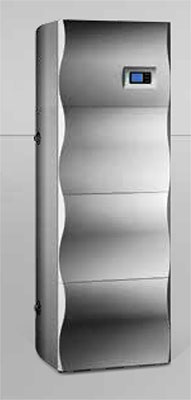The Benefits of Air Source Heat Pumps
Heat pumps work to efficiently and cost effectively heat homes and water supplies by harnessing free, renewable energy sources. They operate by pumping heat from a low temperature source such as from underground or our air, and releasing it at higher temperatures into the home’s heating system.
In technical terms, an air source heat pump (ASHP) system transfer’s exterior heat to interior heat by using a refrigerant system which involves a compressor and a condenser used to absorb sources of heat in one area and release it elsewhere. Alternatively, they can be used vice versa as a cooler and are often called “reverse cycle air conditioners”. For domestic use, heat pumps absorb heat from outdoors and release it inside the home as air, hot water filled radiators, underfloor heating or hot water heating.
What are the Benefits?
Unlike traditional, conventional oil and gas boilers, heat pumps can deliver home and commercial property heating at significantly lower cost and over much longer periods. During the winter months, heat pumps generally need to be kept on constantly so that they effectively heat the homes; however, at low cost this is not an issue. Additionally, radiators will no longer feel too hot to touch; instead they will regulate heat equally around the room.
- Fuel bills will significantly decrease, particularly if you plan to replace your existing conventional heating system.
- Decreased home carbon emissions.
- No more oil deliveries required.
- Low maintenance and repair costs.
- Simple to install.
Air to Water versus Air to Air Heat Pumps
There are two main types of air source heat pump systems:
1. Air to Water
An air to water heat system distributes heat through the property’s central heating system. Due to the fact that they are set at lower temperatures than traditional heating sources, air to water heat pumps are commonly used for underfloor heating or where larger radiators are installed.
2. Air to Air
An air to air heat pump system works to produce water air and circulate it evenly throughout domestic and commercial buildings. However, air to air heat pumps will not provide an all year round source of hot water supply.

Should I Install an Air Source Heat Pump?
Air source heat pumps are not appropriate for everyone. To determine whether your home is suitable to have a heat pump installed and if its benefits are significant to you; we have compiled a short list of questions below.
1. Do you have sufficient space?
In order to install a heat pump outdoors, you will require a suitable area where the unit can be easily mounted and fitted to a wall or placed on flat ground. The unit will need space around it so that area can circulate. Walls or areas where sun frequently hits is advised for best results.
2. Is your home adequately insulated?
Air heat pumps work best when heat is produced at low temperature and therefore, it is vital that your home is well insulated and draught free before installing an air source heating system.
3. What fuel source do you plan to replace?
Air source heat pumps perform better with underfloor heating systems or with warm air heating than with regular radiator based systems due to the lower water temperatures necessary.
4. Will the heat pump be installed in a new build?
Although the cost of installing a heat pump system pays itself back very quickly in terms of offering lower heating costs; it is significantly cheaper to install these systems while constructing a new build. Also, before beginning the installation process, the developer must adhere to all relevant planning permission regulations.
Have you experienced the benefits yet?
If you have had a heat pump installed in your home have you found the benefits? If so please share with our readers by using the comment form below.

